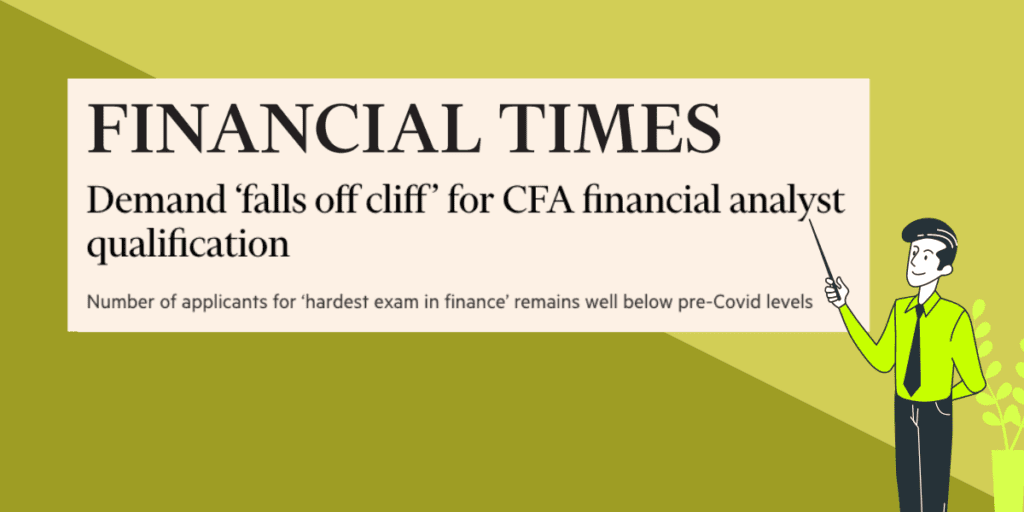You may have read an article recently published in the Financial Times (FT) with the headline: “Demand ‘falls off cliff’ for CFA financial analyst qualification“.

While the FT article reports on the fall of registration numbers around the CFA exams and reasons why this may be happening, the article quickly became a flashpoint of disgruntled candidates airing their dissatisfactions about CFA Institute of late.
CFA Institute’s image has taken a bit of a knock since Covid hit among candidates, with the multiple bouts of CFA exam cancellations, and constantly changing deferral and refund policies.
We reached out to CFA Institute for specific responses on the FT article, as well as the strongest themes from the emerging discussions. CFA Institute has provided them below, and we’ve also weighed in on each theme.
Ready? Read on!
“CFA Program has outdated or irrelevant curriculum.”

Financial Times article quoting a “senior CFA Institute staff member”
“People today are turned off by studying for long hours for an exam with a low pass rate that is only valued by employers when they apply for a job, and is irrelevant thereafter . . . The CFA Institute has not kept up with current learning practices . . . Gen Z want . . . to gain knowledge and skills to do their current jobs and less structured courses.”
In our history, 291,570 candidates have passed LIII (Source: Historical Pass Rate Page). 97% of our more than 190,000 members globally are currently CFA charterholders. Clearly many, many professionals see value in it.
We’re very aware not just in the CFA Program but in other learning offerings we’re developing that the way people learn is changing and that the old modalities are not going to be the new modalities; we are responding to that.
We’ve made changes already in how exams are administered. And we are making changes in how we test knowledge and will continue to build on that. This includes evolving our Learning Ecosystem (LES) which offers resources that candidates can use to help them succeed on exam day.
With the 2023 curriculum, we have aligned the content with learning best practice to meet adult learners’ needs. Each learning module is designed to be completed in an evening of study, and formative assessments are included throughout. The modules incorporate more visuals, spreadsheets, and realistic content, plus expert demonstrations followed by opportunities for candidates to practice the skills. As mentioned previously, the new Derivatives readings at L1 showcase the direction we’re heading.
We also introduced a new mobile app to allow candidates to access content on our Learning Ecosystem via their mobile devices. This app provides candidates with access to our materials in an environment with which they are familiar.

Moneybagg Yo (FT article user comment)
“The syllabus has drifted too far from what’s actually useful in the real world. Accounting or coding experience is far more useful than some ESG Mumbo jumbo or being able to calculate Black Scholes using a protractor and an envelope.”
We fundamentally offer a foundational cross-asset security analysis and valuation course and exam.
We do teach accounting as part of that. ESG is a set of emergent risk areas that were not well priced before. All key risk factors are important for security analysis. Black Scholes Model is the best way to introduce the basic relationships that drive option valuation. With the growth of the volatility trading complex, it’s important to learn things such as the difference between realized and implied volatility and the term structure of volatility.
JBCSC (FT article user comment)
We used to demand new hires take the program. No more. We then decided that studying Buffett and accounting were more important than ESG and assorted modern portfolio nonsense.
The CFA Program was never mandatory, but many employers list it in job descriptions as a “preferred” qualification. The charter is a widely respected credential in the investment profession and is often supported financially by many top investment organizations for their employees to pursue.
Studying the works of investment luminaries and reading is critical for investment professionals. One thing that the CFA Program teaches individuals is how to read and assimilate large bodies of text. Doing so repeatedly is critical for success in investing. Malcolm Gladwell said that you need to spend 10,000 hours to master anything. The 1,000 hours studying the CFA Program we believe is a force multiplier in that endeavor.
Maya.v (FT article user comment)
Having recently passed Level 2 (at the request of my employer), I can confirm that memorising 800 formulas was a complete waste of time. This exam does not help you accumulate knowledge. Instead it tests the ability to memorise thousands of unrelated topics, all to be regurgitated during the exam and forgotten soon after. A form of intellectual prostitution, if you ask me.
While few can permanently memorize 9,000 pages, a lot of CFA charterholders would tell you that they learned many things in the CFA program they use in their day-to-day jobs. Triangular arbitrage, WACC calculation, unlevered beta, false positives, the inverted yield curve, just to name a few.
300Hours’ opinion: Do we think CFA Institute has irrelevant and outdated curriculum?
No curriculum will be a complete match to everyone’s circumstances. The CFA curriculum is (intentionally) super-broad, so you learn a wide range of things across the financial sector.
If we use an analogy of training to be a chef, the CFA curriculum is like learning food preparation, frying, baking, bread-making, roasting, soups and stocks, plating, cocktails, sommeliership, nutrition and food storage. Budding chefs might then complain that “all this gibberish about cocktails and wine is useless since everyone is looking for bakers these days!”. If learning a targeted skill is what you want or need for your situation, then do that instead of the CFA Program.
I’m not convinced that with the budget and resources they have, CFA Institute has irrelevant and outdated curriculum for their foremost examination program. Yes, CFA Institute may have an image of being stuffy and archaic, but it doesn’t mean that that translates to their curriculum being out-of-date.
“CFA charter does not really help with job searches.”

MES (FT article user comment)
“Just my personal experience, and certainly others’ may differ, but after 15 years of (front office) bulge bracket investment bank experience and then buy side experience, I never once hired anyone, or heard of anyone being hired or not, based on a CFA certification.”
While the CFA may not be the sole reason an individual is hired, it is a signal to the market that an investment professional has taken their education further, has the requisite skills and training, and adheres to a code of ethics.
There are many individuals who say that the CFA credential helped them be picked out of resume screens. We have also heard that in a scenario where there is a tie break between candidates, the CFA charter can tip the balance. Tie breaks happen all the time in recruiting.
In a recent survey of rising seniors who passed LI in the August 2021 window, more than 60% said that their LI pass was “pivotal” in their internship or job search.
Turing Test Bot (FT article user comment)
“I have my cfa and the drop in demand isn’t about covid. It’s about candidates not seeing any value in it. The CFA is difficult but it doesn’t guarantee you anything. It’s not a law degree and it’s not an accountancy cert – both of which qualify you for a very specific role. The CFA is just this vague qualification that everyone seems to have now.”
Unfortunately, as is the same with law degrees and accountancy certifications, there is no guarantee as it relates to securing a job regardless of the further education that you pursue.
There are 190,000 charterholders globally versus more than 2 million institutional finance professionals. Meanwhile the US alone mints 200,000 new MBA holders per year (source: Department of Education). MBAs unfortunately don’t come with a guarantee either.
300Hours’ opinion: Do we think the CFA charter doesn’t really help with job searches?
Everything helps. But what I think happens a lot is when it doesn’t meet their (sometimes unrealistic) expectations of how much it helps.
We have experience CFA candidates that apparently believe that some qualifications are somehow like a ‘members club’, where if you pass their exams, you are offered jobs just because you have something others don’t have.
This is just not true. You want a job, you have to work at getting a job. A qualification helps you differentiate yourself, but it does not act like a special job pass, where interviewers will go “Oh is that a CFA charter? Here, have a job!”.
So I believe that the CFA charter does help with getting a job. How helpful it will be depends on what job and firm you’re targeting, and how you pitch yourself.
“CFA Institute are overly-focused on revenue for themselves.”

xCFA (FT article user comment)
I am a CFA (I know, I know, a charterholder and all that BS). I have zero value from my continued association. I don’t even use the letters. This is a money making racket, just have a look at the remuneration of the board. I feel sick every year the subs are collected.
Stefku (FT article user comment)
From a CFA charter holder of two decades. The CFA Institute is a test administration organization. So why does it have almost USD 700m in cash and investments and spend over USD120m on salary and benefits alone, a third which is for management and general? CFA staff today earn substantially more than most of the professionals they credential. No lost tears that there are fewer test takers.
CFA Institute engaged Korn Ferry [HR consulting firm] to assess the competitiveness of our executives’ pay against several competitive frames of reference. Outlined below is additional information related to their assessment:
Korn Ferry utilized the Not-for-Profit peer group that is disclosed each year in the CFA Institute annual proxy report and collected data for these companies from their Form 990 filings. Korn Ferry matched each CFA executive to similar roles in size and scope among peer companies.
Korn Ferry also used a proprietary job evaluation methodology for each CFA Institute role to evaluate the size and scope of each role and compared it to similar roles 7 within the broader market, as an additional frame of reference to complement the Form 990 data.
Overall, CFA Institute executive compensation is competitive with market-based norms. It is simply incorrect to say that CFA staff overall earn more than professionals in the field.
Beyond our compensation structure, our Board of Governors maintains a conservative policy with respect to our reserves in the event of a major business disruption. At the close of FY2021, we had about $530 million in reserves.
300Hours’ opinion: Do we think CFA Institute are overly-focused on revenue for themselves?
Oof, this is a thorny one. I’m split.
On one hand, I think that with the level of visibility and scale you’re talking for CFA Institute, it would be difficult for CFA Institute to maintain some kind of ‘salary cartel’ deal going. You know, where the board will vote to pay everyone loads and everyone-scratches-each-other’s-back kind of setup. Unlikely.
Are CFA Institute management executives paid a lot? Absolutely. But are they paid competitively? Also probably yes. If you’re hiring on a C-suite level from the finance industry, you pay top dollar, otherwise you can’t stay competitive.
What is a popular complaint, though, is candidates and charterholders feel that they don’t get a lot back for the high fees and yearly membership fees they pay. Admittedly, I don’t know a whole lot about the kind of “major business disruptions” CFA Institute may face, a war chest of half a billion dollars (about 2x CFA Institute’s annual revenue) sounds a little excessive to me. They did say they are being conservative with it!
What about you?

I’m curious to hear what our readers think. Do you think change is needed at CFA Institute? If you have thoughts on this, weigh in in the comments below!
And on that bombshell, here are some related articles which may be of interest:
- The Value of CFA: Is CFA Worth It? Should I Take It?
- CFA Charterholders: Why Top Firms Prefer Hiring Them
- CFA Careers: What Are Typical Job Opportunities for CFA Charterholders
- CFA Salary: How Much Does A CFA Charter Increase Your Pay By?
- Looking for Good CFA Alternative Courses? Here Are 17 to Consider

The CFA is only this nebulous certification that everyone now appears to possess. similar to Yogi Berra’s famous line, “Nobody goes there anymore because it’s too crowded.”
I am a CFA charterholder. I see no value in being a member but they basically force you to pay the fee! After passing the 3 exams and earning my CFA they basically harass you and intimidate you to “either pay the annual fees or you’re not a CFA and you’re in violation of blablabla disciplinary action blablabla”. What a scam. I have earned my CFA designation through hard work but they only care about you paying fees. If I got anything from it great, but you get almost nothing of real value. Job offers suck. I have way much more success through Headhunters than through CFA offers. To the point I begin to wonder whether they are real. I have gone from loving the program to understand what a huge ripoff it is. Career-wise it has NOT opened ANY doors for me. I have learnt a lot through MY OWN study and hard work. It is a great option if you want to learn a lot about financial markets (from a theoretical standpoint) but don’t kid yourself. It is a great thing to aspire to but of little to no value. At least in my experience.
so they have 530mn in reserve but fired all their employees during covid. Makes no sense for a non-profit right?
1) I feel that membership should be somehow rewarded by the CFA Institute beyond the right of putting three letters after your name.
2) More transparency about the rationale of the curriculum choices has been asked for a long time now.
3) Also very important: the drop of trust, the members disillusion, and the criticism of board members huge paycheques are symptoms of a real crisis for the CFAI.
Thus, more general information should be given about board members competences and the rationale for such a salary.
“I have my cfa and the drop in demand isn’t about covid. It’s about candidates not seeing any value in it. (…) The CFA is just this vague qualification that everyone seems to have now.” sounds a lot like Yogi Berra’s “Nobody goes there anymore because it’s too crowded.”
It seems to me that CFA Institute is attempting to update / add to the curriculum, based on the last annual meeting (e.g. discussions around Python, financial modeling, etc.). I have, however, felt that the Institute has been focused on revenues, as others have opined. It seems they should spend more on membership not only vis-a-vis content but also as it relates to membership experience. The revenue focus has led to member dissatisfaction or under-appreciation, in my view.
With respect to the comment about memorizing formulas and “intellectual prostitution”; I think that candidate really missed an opportunity to LEARN as opposed to memorize. If you can understand a formula, you don’t really have to “memorize” it. Indeed, that’s the whole point!